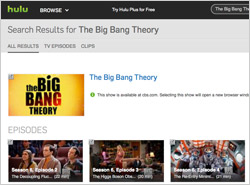Hulu Builds Content Library Via CBS Deal
- by Gavin O'Malley @mp_gavin, November 5, 2012
 Even before Providence Equity
Partners officially sold its stake in Hulu last month, there was wide speculation regarding the future of the video venture, and its ability to attract quality content.
Even before Providence Equity
Partners officially sold its stake in Hulu last month, there was wide speculation regarding the future of the video venture, and its ability to attract quality content.
Somewhat
easing such concerns, CBS Corporation just agreed to a non-exclusive, multi-year licensing agreement to stream programs on the Hulu Plus subscription service. Financial terms of the deal were not
disclosed.
“We remain ever-focused on building a differentiated and high-value service for our customers,” Andy Forssell, SVP of content at Hulu, said Monday.
Effective January 2013, Hulu Plus subscribers will have access to more than 2,600 episodes from CBS library series such as “Medium,” “Numb3rs” and “CSI:
Miami” to classic shows like “Star Trek,” “I Love Lucy” and “The Twilight Zone.”
In addition to CBS, recent content deals with World
Wrestling Entertainment -- and the expansion of its partnership with Viacom to include Nickelodeon content -- suggest Hulu is moving in the right direction.
Earlier this
year, Hulu Plus said it had more than 2 million paying subscribers, each of whom pays $7.99 a month for the service.
Last month, comScore reported that Hulu saw its viewership number
fall sharply in 2012, including a 58% drop to 65 million hours viewed in August. The research firm, however, attributed the decline to a “refinement of tag collection mechanisms,” as well
as a broader enumeration change.
Meanwhile, Nielsen reported that Hulu -- excluding Hulu Plus -- saw unique monthly visitors decline to 12 million in August from 19 million last
December.
Last year, Hulu said it made $420 million. A number of suitors -- including Yahoo, Amazon, Dish, and Google -- were also considering bids for Hulu for as much as $2 billion.
Originally purchased in 2007 for $100 million, Providence Equity sold its 10% share back to co-owners News Corp., Comcast and Disney for $200 million last month. The deal
valued Hulu at $2 billion.
With the divestment, top Hulu executives whose shares have already vested should now have the option to cash out of the company. Sources told
Variety over the summer that CEO Jason Kilar could cash out at close to $100 million, at which point he would likely leave the company.


